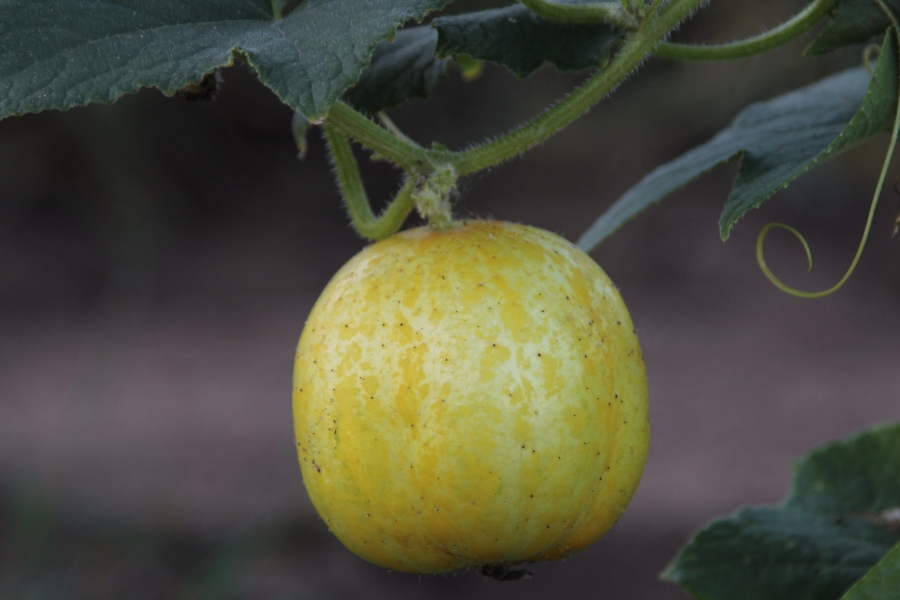Hello, garden enthusiasts and health-conscious foodies! Let’s dive into the world of lemon cucumbers today. If you haven’t encountered a lemon cucumber yet, picture this: a small, round, yellow fruit, resembling a lemon but with the crisp texture of a cucumber. Intrigued? I was too, the first time I laid my hands on one.
Table of Contents
Lemon cucumbers have been a staple in many home gardens, particularly because of their adaptability and unique taste profile. They offer a subtly sweet taste, contrasting the slightly bitter undertones you might find in a regular green cucumber. But it’s not just about the flavor; growing lemon cucumbers is an adventure in itself. From selecting the best seeds to knowing the exact moment to pluck them off the vine, every step offers something new.
In this post, we’ll journey through the specifics of this delightful fruit—how it grows, its benefits, and even some tips on pickling. Whether you’re aiming to cultivate these in the sunny state of Florida or simply want to understand the nuances of this variety, we’ve got you covered.
So, tie up your gardening boots, grab your favorite trowel, and let’s unearth the secrets of the lemon cucumber!
Lemon Cucumber: An Overview
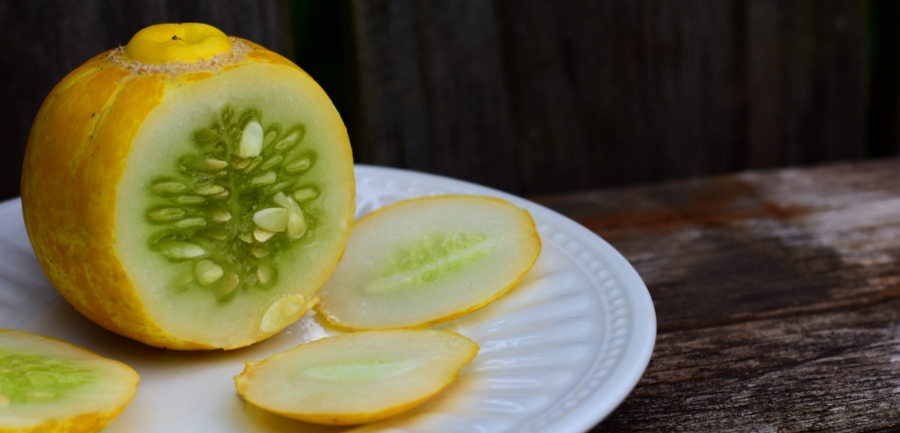
Alright, let’s kick things off by truly getting to know the star of our show: the lemon cucumber.
What is a Lemon Cucumber?
Before we delve deeper, let’s clear up a misconception. Despite its name and color, the lemon cucumber doesn’t taste like lemons. The name mainly derives from its striking resemblance to the citrus fruit in terms of size and color.
Introduction to its unique flavor and appearance:
- Shape: Perfectly round, slightly smaller than a tennis ball.
- Color: Ranges from pale yellow to a bright sun-kissed hue.
- Texture: Crisp, like biting into a fresh apple.
- Taste: A refreshing cucumber taste with a hint of sweetness, making it a favorite for raw snacks or salads.
Comparison with regular cucumbers:
- Size: Regular cucumbers are usually longer, whereas lemon cucumbers are compact and round.
- Skin: Lemon cucumbers have a tender skin that’s easier to eat. No need to peel!
- Shelf Life: Just like your typical cucumber, it’s best to consume them within a week for maximum freshness.
Benefits of Including Lemon Cucumber in Your Diet
Now, beyond their fun appearance, lemon cucumbers bring a lot to the table, nutritionally speaking.
- Nutritional content:
- Calories: Low in calories, making it a guilt-free snack.
- Vitamins: Packed with Vitamin K, essential for bone health.
- Minerals: Contains a good dose of potassium, which can aid in lowering blood pressure.
- Water content: High! Keeps you hydrated, especially during hot summer months.
Table: Nutrition Facts per 100g of Lemon Cucumber
| Nutrient | Amount |
| Calories | 15 |
| Vitamin K | 16.4 μg |
| Potassium | 147 mg |
| Water | 95.23 g |
Health benefits:
- Digestive Health: The fiber in lemon cucumbers promotes good digestive health.
- Skin Benefits: Rich in antioxidants, which can help reduce skin inflammation and keep your skin glowing.
- Weight Management: Given their low-calorie count and high water content, they can be a perfect addition to a weight management diet.
So there you have it! The lemon cucumber isn’t just another pretty face in the garden; it’s packed with nutrients that make it a must-add to your daily meals.
Lemon Cucumber Plant: Insights and Features
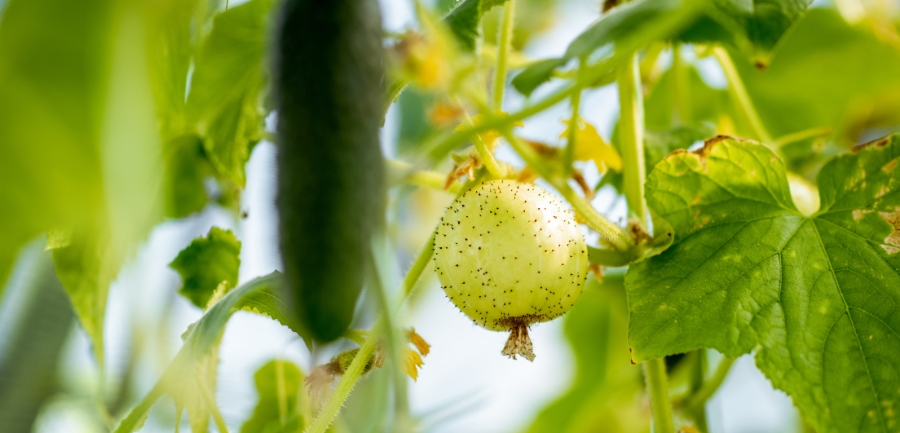
Let’s shift our focus from the dining table back to the garden. Understanding the plant itself can give us a greater appreciation for the fruit it yields, and trust me, the lemon cucumber plant has its own set of wonders to unfold.
Recognizing the Lemon Cucumber Plant
Have you ever walked through a garden, stumbled upon a peculiar plant, and wondered, “What on earth is this?” That was my first reaction when I encountered the lemon cucumber plant. It was love at first sight! If you’re on the lookout, here’s how to recognize one in the wild (or your neighbor’s garden).
Physical appearance and growth pattern:
- Growth Habit: Just like most cucumbers, lemon cucumbers are trailing vines. They love to climb trellises, fences, or any structure they can latch onto. Given the space, they can spread out beautifully, covering the ground as well.
- Height & Spread: On average, the plant can grow up to 6 feet tall, especially if supported. The spread can vary, but with proper spacing, they can stretch out to 4-5 feet.
- Stems: The stems are slightly hairy and robust, perfect for supporting those round fruits.
Leaves, flowers, and fruit features:
- Leaves: They boast large, broad leaves with a slightly rough texture. These leaves are green with a hint of silver and provide an excellent canopy for the fruits.
- Flowers: Before the fruits come the flowers! Expect to see bright yellow flowers that are quite similar to other cucumber plant blossoms. They are a bee’s delight!
- Fruits: As they begin to grow, the fruits are green, eventually turning into the iconic yellow as they mature. It’s like watching little green tennis balls slowly transform into bright lemons.
There’s a sense of pride in recognizing and nurturing a plant, seeing it blossom, and eventually bearing fruit. With this knowledge in your gardening toolkit, spotting and tending to a lemon cucumber plant will be a breeze!
Growing Lemon Cucumber: Best Practices
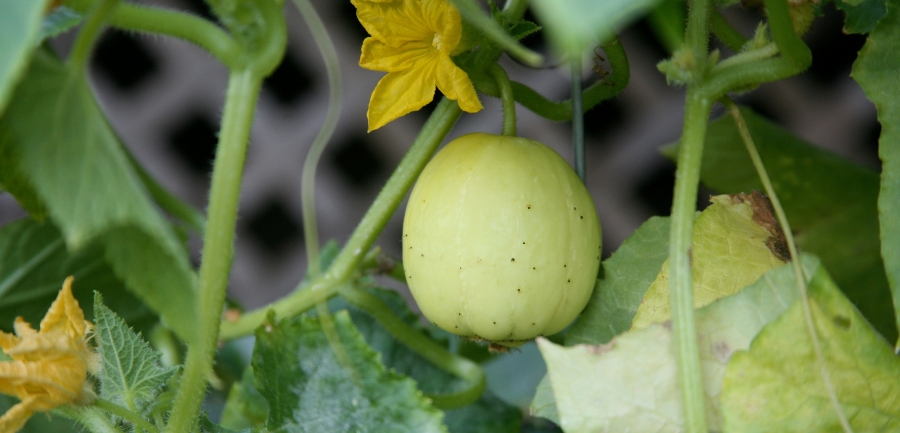
There’s nothing quite like the satisfaction of biting into a cucumber that you’ve grown with your own two hands. But how do you get from a tiny seed to a bountiful harvest? Let’s dive into the best practices to ensure your lemon cucumber plants thrive.
Choosing the Right Lemon Cucumber Seeds
Every fantastic garden journey begins with a seed. But not all seeds are created equal. Here’s how to make sure your lemon cucumber venture starts on the right foot.
Where to buy:
- Local Nurseries: They often stock seeds adapted to your local climate. Plus, the gardening experts there can offer invaluable advice.
- Online Stores: Websites offer a variety of seeds with user reviews to help guide your purchase.
- Seed Swap Events: Join local gardening clubs or communities. Often, they host seed swap events where you can exchange seeds with fellow gardening enthusiasts.
Selecting quality seeds:
- Packaging Date: Always check the packaging date. Fresh is best! Seeds that are less than a year old generally have a higher germination rate.
- Appearance: Quality seeds are usually plump and firm to the touch. Avoid those that appear shriveled or overly dry.
- Reputation: If buying online, always check reviews and ratings. Fellow gardeners can be your best guide.
How Deep are Cucumber Roots?
It’s not just about what’s above the ground. What happens underneath is equally vital.
Importance of deep soil preparation:
- Root Spread: Cucumber roots can dive deep, often reaching depths of 18 inches or more. A well-prepped soil allows them to spread out and absorb nutrients effectively.
- Avoiding Compaction: Compact soil can stunt root growth. Ensure you’ve loosened your soil to a good depth before planting.
Tips for ensuring root health:
- Regular Watering: Cucumbers are thirsty plants. While they don’t like waterlogged roots, consistent moisture ensures healthy growth.
- Mulching: Adding a layer of organic mulch can prevent the soil from drying out too quickly and help regulate soil temperature.
- Watch for Pests: Root-eating pests can be a nightmare. Regularly check your plants and the soil around them for any signs of distress.
Growing Cucumbers in Florida: Specific Tips
Ah, the Sunshine State! While Florida offers plenty of sun, growing cucumbers here has its quirks.
Climate considerations:
- Heat Tolerance: Lemon cucumbers are heat-tolerant, making them suitable for Florida’s warm climate. However, during extreme heat, some afternoon shade can be beneficial.
- Planting Time: Consider planting in both spring and fall. The mild winter months can yield a delightful off-season harvest.
Soil and watering recommendations:
- Well-Draining Soil: Florida’s frequent rains mean your soil should be well-draining to prevent root rot.
- Consistency is Key: Despite the rains, consistent watering patterns are essential. Installing a drip irrigation system can be a game-changer.
- pH Levels: Cucumbers prefer slightly acidic to neutral soil (pH 6.0-7.0). If unsure, consider getting a soil test kit from your local nursery.
By embracing these best practices, you’ll set the stage for a bountiful harvest, making all your gardening efforts worthwhile!
Round Cucumber: The Shape That Stands Out
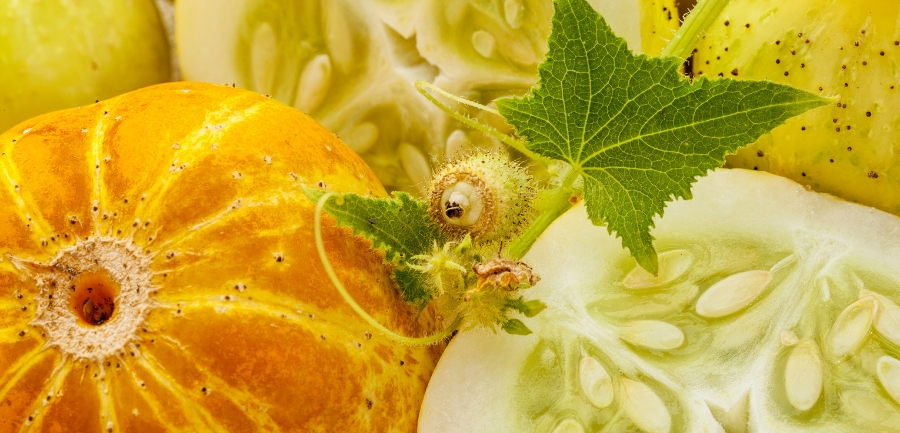
If you’re like me, the first time you saw a round cucumber, it was a moment of pleasant surprise. A cucumber that’s not long and slender? The garden truly is full of wonders. Let’s dive into what makes the round cucumber, particularly the lemon cucumber, a shape that captures attention.
Distinguishing Between Lemon and Other Round Cucumbers
It’s easy to get lost in a world of cucumbers. While the lemon cucumber is a star, there are other round cucumbers out there. Let’s distinguish our lemony friend from its round counterparts.
Varieties of round cucumbers:
- Apple Cucumbers: These have a pale green skin, resembling an apple (hence the name). They’re sweet, tender, and perfect for fresh consumption.
- Crystal Apple Cucumbers: A slightly translucent cousin of the apple cucumber. Their delicate skin and sweet taste make them a garden favorite.
- Russian Pickling Cucumbers: Small, round, and perfect for—you guessed it—pickling! They usually come with a slightly tougher skin, ideal for retaining that crunch after pickling.
Unique features of the lemon cucumber shape:
- Size and Color: The lemon cucumber stands out with its lemon-like appearance—round and yellow. Think of it as nature playing a fun trick on our eyes!
- Skin Texture: Unlike some of its round peers, the lemon cucumber boasts relatively thin, delicate skin. It adds to the overall palatability, ensuring you can eat it without the hassle of peeling.
- Versatility in Dishes: Thanks to its distinct shape and size, the lemon cucumber becomes an excellent candidate for stuffing or creating fancy salad presentations.
With these insights, the next time you’re at a farmer’s market or planning your garden, you’ll know exactly what round cucumber you’re looking at. While each has its unique charm, there’s no denying that the lemon cucumber, with its sunny disposition, holds a special place in our hearts (and gardens).
Pickling Lemon Cucumbers: A Tangy Treat

If there’s a way to preserve the sunny taste of summer, it’s through pickling. And guess what? Lemon cucumbers make for an incredible pickled treat! Their unique shape and flavor profile add a zingy twist to the classic pickle jar. Ready to try it out? Let’s dive in.
Preparing Your Lemon Cucumbers for Pickling
Pickling is an art, and like all good art, it begins with the perfect canvas. Here’s how to choose and prepare your lemon cucumbers for the best pickling results.
Selecting the right size and ripeness:
- Size Matters: Opt for smaller, firm lemon cucumbers. They tend to be crisper and will retain that desired crunch after pickling.
- Ripeness Check: Choose cucumbers that are slightly underripe. Overripe cucumbers can turn mushy during the pickling process. A pale yellow, firm texture is your go-to!
Cleaning and prepping methods:
- Rinse Well: Ensure all dirt and debris are washed off. Using cold water will also keep them crisp.
- Trimming: Trim off the blossom end of the cucumber. It contains enzymes that can soften your pickles.
- Slicing or Whole: You can slice them into rounds or spears, or pickle them whole. Your choice depends on your preference and the size of your jars.
Recipe Ideas and Flavor Combinations
Alright, the stage is set. Now, let’s dive into the main event – the pickling!
Classic pickling recipe:
Ingredients:
- Lemon cucumbers (prepared as above)
- 2 cups white vinegar
- 2 cups water
- 2 tablespoons pickling
- salt
- 4 garlic cloves
- Fresh dill sprigs
Method:
- In a pot, bring vinegar, water, and pickling salt to a boil until the salt dissolves. Let it cool.
- Pack your jars with lemon cucumbers, garlic cloves, and dill.
- Pour the cooled brine over the cucumbers, ensuring they’re submerged.
- Seal the jars and refrigerate. For the best flavor, let them sit for at least a week before munching.
Adding unique spices and flavors:
- Spicy Kick: Add a sliced jalapeño or red chili flakes for a fiery twist.
- Sweet and Tangy: Introduce a hint of sweetness with a tablespoon of sugar or some sliced red onions.
- Herb Delight: Rosemary, thyme, or even cilantro can offer a fresh and aromatic punch to your pickles.
Pickling may be an age-old tradition, but with lemon cucumbers, it feels brand new all over again. Experiment, enjoy the process, and relish the tangy treats you’ve crafted!
When to Pick Lemon Cucumber: Timing is Key

Have you ever anticipated a moment so much that you either jumped the gun or missed the boat? Yep, gardening can feel that way, especially when you’re waiting for the perfect moment to harvest. And when it comes to the lemon cucumber, timing truly is everything. Let’s unlock the mystery of the perfect pick.
Recognizing the Signs of Maturity
Like reading tea leaves or predicting the weather, determining the right time to pick your lemon cucumbers can seem like an art. Thankfully, there are some clear signs that nature gives us.
Color and texture indications:
- The shade of Yellow: A mature lemon cucumber adopts a lovely pale yellow hue. It might be tempting to wait until it’s a deep yellow, but by then, it might be overripe.
- Skin’s Feel: Gently press the skin with your thumb. If it yields just slightly but remains firm overall, it’s prime time.
Taste test method:
- Sampling: Sometimes, the best way to know is to taste. Pick a cucumber, slice it open, and have a bite. A mature one will have a mildly sweet flavor and a juicy, crisp texture.
- Seeds Check Peek inside. If the seeds are small and tender, it’s ready. If they’re large and hard, it’s been on the vine a touch too long.
Storing and Preserving Freshly Picked Lemon Cucumbers
You’ve mastered the art of picking. Now, how do you ensure your harvest stays fresh?
Refrigeration guidelines:
- Cool, Not Cold: Store your lemon cucumbers in the crisper drawer of your fridge. This area offers the right humidity and temperature.
- Stay Dry: Before refrigerating, make sure your cucumbers are dry. Any moisture can expedite rotting. Using a paper towel to gently pat them down is a good idea.
- Shelf Life: In the fridge, they’ll typically last about a week. If you notice any soft spots or wrinkles, it’s time to use them.
Can it be frozen or canned?
- Freezing: While you can freeze cucumbers, be prepared for a change in texture upon thawing. They can become a bit mushy, which might not be ideal for salads but can work in smoothies or juices.
- Canning: Absolutely! Beyond the aforementioned pickling, you can have lemon cucumbers in various recipes. It’s a fantastic way to preserve their freshness for months.
In the grand symphony of gardening, harvesting is that crescendo moment. With these tips, you’re not just in tune with your garden’s rhythm; you’re leading the orchestra. Happy harvesting!
The world of gardening offers many delightful surprises, and the lemon cucumber is undoubtedly one of its shining stars. From its distinctive appearance and flavor to its versatility in dishes and preservation methods, this cheerful fruit teaches us patience, timing, and the joys of reaping what we sow. Whether you’re a seasoned gardener or someone planting their first seed, the journey with the lemon cucumber is bound to be a memorable one. So the next time you spot that sun-kissed, round gem in your garden or local market, remember the stories it holds, the flavors it promises, and the adventures it beckons. Here’s to many more seasons of discovery and delight with the lemon cucumber!
FAQs
What is lemon cucumbers good for?
Lemon cucumbers are rich in antioxidants, vitamins, and hydration, promoting skin health and overall wellness.
What does lemon cucumber taste like?
Lemon cucumbers offer a mild, sweet flavor, with a slightly tangy undertone, similar to regular cucumbers but less bitter.
What’s the difference between lemon cucumber and regular cucumber?
Lemon cucumbers are round, yellow, and slightly sweeter, while regular cucumbers are longer, green, and can be slightly bitter.
Can you eat raw lemon cucumbers?
Absolutely! Raw lemon cucumbers are crisp, refreshing, and perfect for salads or snacking.

